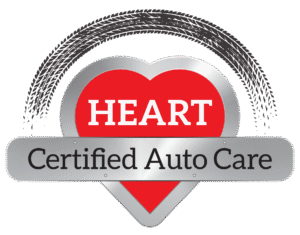The sound of your car’s brakes grinding is a clear red alert. It’s the audible warning alarm that something may be wrong with the most critical safety system in your vehicle. If you ignore this alarming sound, you could be putting yourself and others on the road in danger. The importance of fully functioning brakes cannot be overstated. They’re not just about stopping your car; they’re about keeping you safe.
1. Worn Brake Pads
One of the most common causes of brakes grinding is worn brake pads. Brake pads are like the cushions between your car’s brake calipers and the rotors. Over time, these pads wear down, and when they do, they cause a grinding noise. Replacing brake pads regularly is crucial to preventing this problem.
To check your brake pads for wear, listen carefully. If you hear a high-pitched squealing noise when you apply the brakes, it’s likely time to replace your brake pads. Additionally, many modern cars have a built-in warning system that alerts you when your brake pads are nearing the end of their lifespan.
2. Rusted Rotors
Rusted rotors are another reason why your brakes might be grinding. When your car sits idle, especially in damp conditions, rust can form on the rotors. This rust can cause a grinding noise when you apply the brakes. Regular maintenance and inspection can help prevent rust from forming on your rotors.
To prevent rust on your rotors, try to avoid parking your car in damp or wet areas for extended periods. Also, if you live in an area where roads are salted during winter, make sure to wash your car frequently to remove any salt residue.
3. Caliper Issues
Caliper issues can also cause your brakes to grind. The calipers are part of your car’s braking system that squeeze the brake pads against the rotors to slow your car down. If the calipers are worn or damaged, they may not release fully from the rotors, causing a grinding noise.
Regular maintenance and inspection can help prevent caliper issues. If you notice a grinding noise when you apply the brakes, it’s a good idea to have your calipers inspected by a professional.
4. Loose or Broken Parts
Loose or broken parts in your braking system can also lead to grinding noises. These could include anything from worn-out brake pads to a loose caliper. Regular vehicle inspections can help detect these issues before they become serious problems.
To check for loose or broken parts, listen for unusual noises when you apply the brakes. If you hear grinding, squealing, or rattling, it’s time to have your brakes inspected by a professional.
5. Contaminated Brake Fluid
Contaminated brake fluid is another potential cause of grinding brakes. Brake fluid is crucial for maintaining the pressure necessary for your brakes to function correctly. If the fluid becomes contaminated with dirt, water, or other debris, it can cause your brakes to grind.
Regular brake fluid flushes can help prevent this problem. To check your brake fluid for contamination, look at the color of the fluid. If it’s dark or dirty, it’s time for a fluid change.
6. Worn Wheel Bearings
Worn wheel bearings can also cause your brakes to grind. These bearings allow the wheels to spin freely, but over time, they can wear out and cause a grinding noise when you apply the brakes.
Regular maintenance and replacement of wheel bearings can prevent this issue. To check your wheel bearings for wear, listen for a humming or growling noise when you drive. If you notice these noises, it’s time to have your wheel bearings inspected.
7. Improper Brake Installation
Finally, improper brake installation can cause grinding noises. If the brakes are not installed correctly, they may not function as they should, leading to a grinding noise.
Having your brakes installed by a professional is crucial to ensure that they function correctly. When choosing a mechanic, look for one with good reviews and certifications from recognized automotive organizations.
Brake Maintenance Schedule
Maintaining the brakes on your vehicle is paramount for safe driving. A regular maintenance schedule based on the manufacturer’s recommendations can help ensure that your brakes are always in good working condition. While the exact schedule can vary depending on your driving habits and the road conditions you encounter, here are some general guidelines to follow.
- Every 12,000 miles: As a general rule, check your brake pads. Regular checks can help detect any wear and tear early on and prevent further damage to your braking system.
- Every 20,000 or every six months: Brake maintenance is recommended within this range. Some drivers prefer to have their brakes checked each time they get their oil changed.
- Every 25,000 miles: Most manufacturers recommend changing the brake fluid at this point. This helps maintain the pressure necessary for your brakes to function correctly.
- Every 30,000, 60,000, and 90,000 miles: Certain items need to be inspected, changed, or replaced. Always check for signs of wear and tear on your brake pads and other components.
- Every 40,000 – 70,000 miles: It’s time to check your brake rotors. Depending on their condition, you might need to resurface or replace them.
- Every 50,000 miles: At this stage, both your battery and brakes should be checked. You might need to replace your brake pads or other parts depending on their condition.
When to Bring Your Car to a Mechanic
If you hear unusual noises (like grinding or squealing), feel vibrations when braking, or if your car pulls to one side when you brake, it’s time to bring your car to a professional. Also, if your brake warning light is on, don’t ignore it. These signs could indicate worn brake pads, rusted rotors, caliper issues, or other serious problems.
Regularly maintaining your brakes based on the recommended schedule is an essential part of vehicle ownership. Regular checks and timely replacements not only ensure the optimal functioning of your braking system but also increase your safety on the road. Remember, when in doubt, it’s always better to consult with a professional mechanic.
Experience Unmatched Auto Care in Chicago with HEART!
Attention, Chicago! For all your auto repair needs, put your trust in the dedicated hands of HEART Auto Care. Our team of seasoned mechanics are committed to providing top-notch service and unparalleled expertise. Whether it’s a simple oil change, brake repair, or a complex engine issue, we have the skills to get the job done right. Don’t let car troubles slow you down. Reach out to us at HEART Auto Care today, where we treat every vehicle with the care and precision it deserves. Remember, when it comes to superior auto care in Chicago, your car has a place in our HEART!
Reasons Your Brakes are Grinding: In Conclusion
Ignoring grinding noises from your brakes is not just bad for your vehicle; it’s potentially dangerous. Whether it’s worn brake pads, rusted rotors, caliper issues, loose or broken parts, contaminated brake fluid, worn wheel bearings, or improper brake installation, addressing these issues promptly is critical. If you notice a grinding noise when you apply your brakes, don’t ignore it. Seek professional help immediately to ensure your safety and the longevity of your vehicle.





